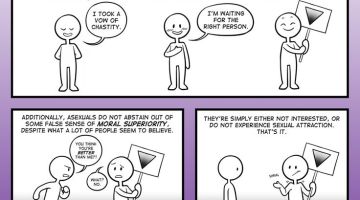
(CC) Robert Sheer, AP/www.usatoday.com
Protestors gather in the state Capitol building in Indianapolis, Indiana in March, 2015. The Religious Freedom Restoration Act has garnered major media attention as a result of its outspoken proponents and opponents.
The rights of the lesbian, gay, bisexual and transgender community have been at the heart of a heated debate with the introduction of two divisive bills presented in the Indiana and Arkansas state legislatures this past month. Commonly known in both states as the Religious Freedom Restoration Act, the bills would enable individuals to sue the government if they felt their First Amendment right of religious freedom was being infringed upon. A popular example explains that the bills would give bakeries the legal foundation to deny wedding cakes for homosexual couples on the basis of their religious freedom.
Due to the sensitive nature of religious and sexual identities, the issue has sparked a spirited national debate with mounting frustration on both sides of the argument. From political figures such as Mike Huckabee to popular periodicals such as The New York Times, opinion leaders have aggressively weighed in, expressing their opinions in one way or another. In an unprecedented move, popular newspaper The Indianapolis Star published a front-page editorial with three prominent words: “Fix this now.”
With the repeal of Don’t Ask Don’t Tell in 2011 and the growing trend of states legalizing gay marriage, the bills are seen as a major step backward in the fight for LGBT equality. However, while the bills themselves levy religious freedoms over the freedom of nondiscrimination, it is important to note that they have also started a necessary conversation about the future of LGBT people in the United States. Although the first drafts of the bills would serve as a setback to the LGBT community, the ultimate effect has been a stronger movement in support of equality.
As a result of the backlash that arose against the RFRA, Gov. Asa Hutchinson of Arkansas and Gov. Mike Pence of Indiana, pushed the bills back to legislature requesting adjustments to the language. The Indianapolis Star reported that both houses amended Indiana’s version of the bill to forbid discrimination on the basis of sexual orientation or gender identity. While some still take issue with certain aspects of the bill, the amendment was a major victory for the LGBT community.
Unfortunately, we do not live in a world where all people are treated equally, but the only way we may ever get there is through starting conversations. An article in The Daily Beast reported that there are currently 20 states that have laws similar to the RFRA — a fact that many people, including myself, find shocking. Had the legislators in Indiana and Arkansas not introduced the bills, many advocates of the LGBT community may have never realized the extent of discrimination in the U.S. today.
The bills made people mad, and that is a good thing. All of the most effective civil rights movements were catalyzed by an injustice. Rosa Parks is commonly referred to in history as the “mother of the freedom movement.” The defiant act of refusing to give up her bus seat to a white passenger and her subsequent arrest has been woven into the fabric of history as a moment that galvanized a stronger, more unified civil rights movement. While the context for the RFRA may be very different, the idea remains the same: movements find power in combating injustice.
While it would be nice to live in a perfect world where equality happens organically, it is important to realize that justice may only be understood when injustice occurs. I do not contend that society should aspire to create prejudice in order to catalyze a movement; rather, society must recognize that opportunity exists within the foundations of discrimination.
Instead of relying on a “woe-is-me” attitude, advocates of social equality have a responsibility to respond to discrimination in a way that will further empower a movement as opposed to being defeated by injustice. In the case of the RFRA, I am proud to say that the LGBT community and its allies used the bills as a means of actualizing change. Thanks to advocates across the country, the language of the bills was changed to reflect a more equal stance on religious freedom.
Don’t get me wrong, there are still a number of issues to be discussed about the RFRA and the injustice it creates, but we must not forget the progress that has been made. The status of LGBT equality may have taken two steps back, but it has also taken one strong step forward. It is moments like these that unify marginalized communities and while those communities may see trying times, there is a beauty in uniting under one cause. If you’re still upset about the RFRA, then good — stay upset. The frustration you feel today may be the driving force behind a movement you will create tomorrow.
Daniel Coffey studies journalism. He can be reached at dcoffey@sagebrush.unr.edu and on Twitter @TheSagebrush.










